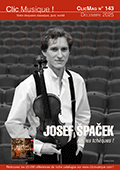 Surprise ! Jiri Barta ose de sa grande caisse une stupéfiante adaptation de la Sonate pour violon. La plaçant au début de son album, il augmente considérablement la portée de ce que Janacek aura écrit pour son instrument, qu’il avait d’abord voué aux contes et aux lieder, archet de pure narration que la Sonate transforme en personnage. Coup de génie, sans un faux plis la Sonate tombe dans ses cordes, rugit et explose sous son archet, magie de la transmutation à laquelle le piano océanique de Terezie Fialova – comme j’aimerai d’elle tout le clavier de Janacek tant elle en parle la langue – ajoute une sorte d’immensité. Prohadka ne sera pas moins réussi, revenant à de pures tendresses, un imaginaire de foret et de feu de cheminée, la Dumka et la Romance, prises aussi au violon mais cela est plus couru, transformée en poèmes lyrique, l’Adagio retiré de Prohadka remis en poème, le presque rien du Presto soudain beau comme un Furiant. Quel disque ! Magnifique texte de Jiri Barta en sus (et en anglais). (Discophilia - Artalinna.com) (Jean-Charles Hoffelé)  Cellist Jirí Bárta and pianist Terezie Fialová dedicate their new album to the legacy of Leoš Janácek. The album features three pieces written originally for violin and piano: the well-known Sonata that had been, nonetheless, neglected at the time of its origin, Dumka, and Romance. The violin parts of the three compositions have been arranged for the cello by Jirí Bárta and are released in a world premiere in this form. Janácek composed Dumka and Romance during his studies in Leipzig, an unhappy period when he tortured himself with doubts about his talent. They both show traces of classicist and romantic style and Barta´s cello recording even more pronounces the wistfully elegiac disposition of the piece. Cello adaptation of the Sonata is based on Janacek´s version from 1922, retaining the key and the having piano part unaltered, while the violin part has mostly been transposed an octave lower. The album also also includes the only two compositions by Janácek intended for cello and piano, Pohádka (Fairy Tale), with a fourth movement that had been part of one of the working versions of the work but discarded later by Janácek, and the short Presto, originally probably intended as one the movements for Pohádka – which also went through diverse stages of germination just as Sonata did, and its last version was published in 1924. Inspiration by the tragic story of the Tale of Tsar Berendey and his child reflects Janácek´s own experience. “Like most of Janácek’s chamber works, Pohádka provides a fascinating insight into the composer’s soul,” says Jirí Bárta and describes his memories of his first encounter of Janacek´s music: “I’m listening to the strangely beautiful music, so different from anything I’d have encountered as a child. Harrowing, yet tender, sad, but in a different way, moving, yet devoid of whining and false tears. (…)In his almost despondent genuineness, he will not forgive any mannerism or insincerity, making it hard for the performer to decipher him. Even at moments of greatest anguish, he is faithful to the principles of beauty and truth.” The catalogue of Animal Music features as well a recording of the two artists’ performance of Beethoven’s Sonatas for piano and cello (2021), and Jirí Bárta’s solo recording of complete Bach’s cello suites (2018).
 |
